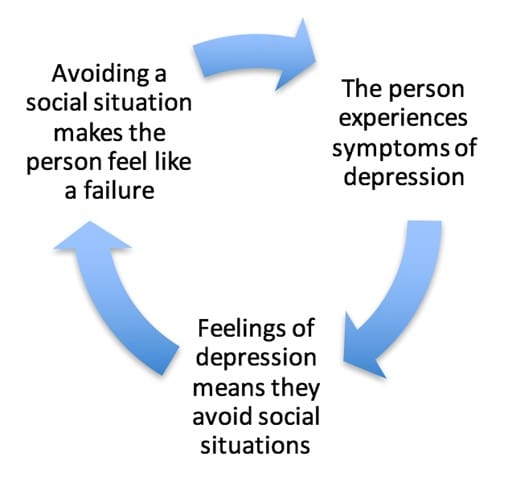In this post
Cognitive behavioural therapy (CBT) is a type of therapy that is commonly used to treat a range of mental health issues. The aims of CBT are to help individuals to change the way that they think (cognitive processes) so that any automatic negative thinking is amended to be more positive and to change the way that people act (behavioural processes) in order to reduce the symptoms that they are experiencing.
An important aspect of CBT is to help the person try and understand that how they think will directly affect the way that they act – therefore if thinking patterns can be changed, it is assumed that this will help to amend any associated behaviour. With depression, if a person can change the thoughts that make them depressed, then the symptoms of their depression should decrease or cease altogether.
The diagram below shows how negative thinking patterns give people irrational and negative beliefs about the future:

However, CBT can help someone overcome such patterns of thinking in a similar cycle:

CBT for depression will usually take place in several stages:
- Stage one: the therapist will encourage the individual to discuss their symptoms and what they believe may potentially be the source of the depression (some people may genuinely not know the reason and so this will need to be explored)
- Stage two: the therapist will encourage the person to challenge their irrational thoughts, such as why they feel like a failure or why they always feel guilty and responsible for events
- Stage three: the individual will be able to replace negative thoughts with more positive ones, for example someone who blames themselves fully for a divorce will be able to see that the problems experienced in the marriage were not attributable to anyone in particular
- Stage four: the individual will be encouraged to try out their new patterns of thinking in between sessions; they may also be asked to keep a diary which details how they feel in certain situations and which may be useful for identifying when negative thoughts are most likely to occur
- Stage five: the person feels that they are now better able to cope and that their negative thinking patterns have been amended to a point where they no longer feel depressed and may be more resilient to depression in the future./li>
CBT as a treatment for addiction
Treating addiction by CBT is slightly different to treating depression, even though the theory behind the therapy remains the same. People who have addictions are encouraged to understand what might trigger their behaviour and subsequently be able to control and manage how they behave. CBT for addiction uses two key components: functional analysis and skills training.
- Functional analysis: this involves a full exploration of the person’s behaviour and what causes them to retain their addiction. The person and their therapist will work together to find out what emotional states might make someone want to take a substance or if the addiction relates to a place or maybe even a person or group of people. When all of this is identified, the person can formulate strategies to avoid certain triggers or to be ready for them and therefore be less likely to react negatively
- Skills training: when a functional analysis has been carried out, the person will be encouraged to be involved in certain skills training, which can be adapted to each person’s addiction. Skills might include:
- o Coping with cravings
- o Being more assertive in the face of any form of trigger, such as someone encouraging them to drink
- o Motivation improvement to help them commit to therapy and to recovery.
- Like with depression, people are asked to keep a diary to record important events so that any other triggers, emotions or reactions can be discussed at future therapy sessions.
Strengths of CBT for depression and addiction
- The use of CBT for depression is thought to be much more effective than medication as it gives people strategies that they are able to apply themselves if they feel the symptoms returning in the future
- Enabling people to take charge of their symptoms and manage them themselves, is likely to increase feelings of confidence and self-esteem
- Skills training for people with addictions can help to ensure that they are equipped not to relapse in the future.
Weaknesses of CBT for depression and addiction
- CBT involves a commitment from people and some are not willing to do this or are not able because their depression means that they lack motivation. These individuals may benefit from medication in the first instance before starting a course of therapy
- Many argue that CBT somehow suggests that people are to blame for their own negative thought processes, which are somehow ‘broken’ and need to be ‘fixed’. It also gives the therapist an opportunity to promote behaviours which they believe are correct, which can be unethical and judgmental
- Addiction can also cause difficulties for people to be able to commit to treatment and CBT can only work if the person wants to change their behaviour
- Skills training for people with addictions does not always mean that the person will use the skills they have learnt.



